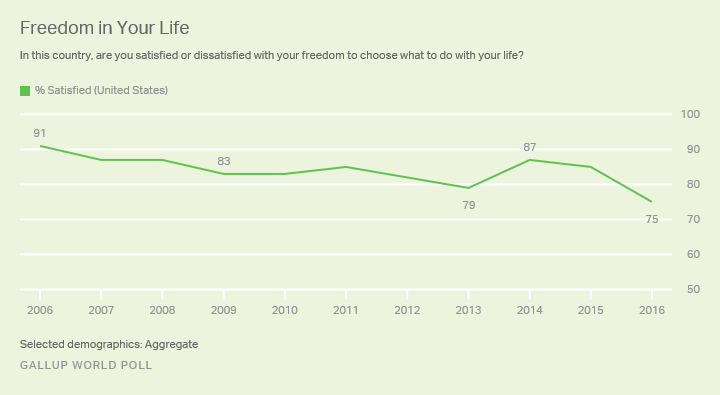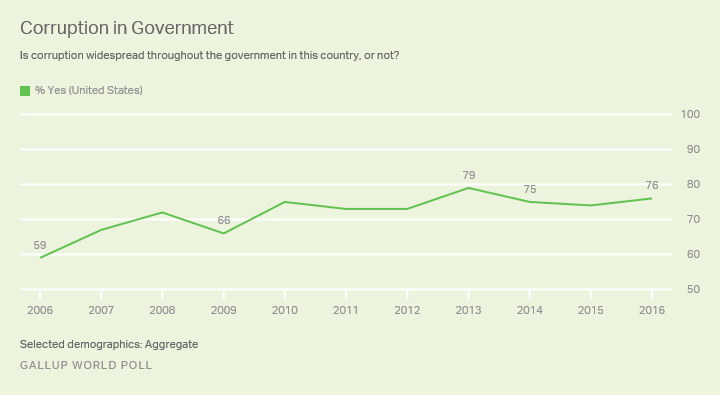
Land of the Free?
Jon Clifton

The 16-percentage-point decline is dramatic -- but looking at how far the U.S. has fallen in comparison with the rest of the world, the decline is even worse. The U.S. ranked 11th when Gallup asked this question in 2006 (among 118 countries). In 2016, the U.S. came in 71st (among 139 countries). This puts the U.S. in the bottom half of all countries measured.
This decline isn't happening in other wealthy democracies. Denmark, Finland and Canada were all tied for first in 2006 -- 96% of people in each country expressed satisfaction with their freedom. Today, those figures are virtually unchanged, and all of them remain in the top 11.
Two things typically come to mind when people think about their personal freedom -- their financial situation and their government.
On a global basis, GDP per capita and attitudes toward individual income are highly related to how people feel about their freedom. Stated simply, people in wealthy countries are more likely than people in less wealthy countries to report being satisfied with their freedom.
Despite widespread reports that the U.S. economy is improving, many Americans may not be feeling the same economic gains in their daily lives. Household income is up since 2011, but it's flat since 2007. And despite unemployment dropping below 5%, the overall jobs picture is not as rosy. Workforce participation is the lowest it's been in 40 years. Using this metric, The Economist says that unemployment for 25- to 54-year-olds is worse in America than in France.
The 2017 Index of Economic Freedom also has seen a significant drop in America's standing in the world since 2006. This index is mostly based on government regulation, the other component that people normally consider when they think about freedom.
As previously reported, views on government corruption are related to how people feel about their individual freedom. This seems to be true in the U.S. -- while satisfaction with freedom has declined, the belief that corruption is widespread in the government has been stubbornly high for a number of years. What's more, approval ratings of virtually all government institutions are near historical lows.

Whether it's their attitude toward the government or toward their own financial situation, tens of millions of Americans feel differently about their freedom as they prepare to celebrate this Fourth of July.
These results are based on telephone and face-to-face interviews with approximately 1,000 adults, aged 15 and older, in over 150 countries, conducted between 2006 and 2016. For results based on the total sample of national adults, one can say with 95% confidence that the maximum margin of sampling error ranges from ±2.1 percentage points for India to ±5.3 percentage points for Iceland. The margin of error reflects the influence of data weighting as well as design effects, where applicable. In addition to sampling error, question wording and practical difficulties in conducting surveys can introduce error or bias into the findings of public opinion polls.
